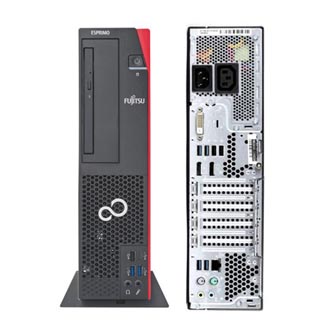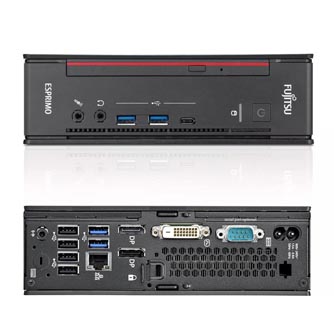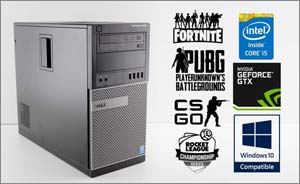Fujitsu Esprimo D958 vs. Fujitsu Esprimo Q958
Comparison and Differences
Differences between Fujitsu Esprimo D958 and Fujitsu Esprimo Q958
Both computers, the Fujitsu Esprimo D958 and the Fujitsu Esprimo Q958, were released during the same year - 2018.
If you are looking for the smaller form factor the Fujitsu Esprimo Q958 is the right one for you. It is smaller than the Fujitsu Esprimo D958 and will fit more easily under your desk.
Processor
The two models have the same generation of Intel processors. We think that the 9 generation of Intel Processors have enough power to execute all of the home and office tasks that most people will care to do.
Memory
Both models have have equal amount of ram slots (4 RAM). Usually two RAM slots are more than enough for most cases. However, the count should be taken into account when planning how much and what combination of RAM you are going to need for your system.
None of the desktops has an advantage when it comes to the speed of the RAM being used. Both models support RAM speeds of up to 2666. Additionally, if you will be needing a lot of RAM, better go for the Fujitsu Esprimo D958 as it has the ability to run 64 GB of RAM. The Fujitsu Esprimo Q958 can do a bit less at max 32 GB. Most of the times, this should be sufficient for the majority of users.
Ports
In total the Fujitsu Esprimo D958 has 11 USB ports. The Fujitsu Esprimo Q958 is inferior in this regard and packs 9 USB ports. In any case, if you miss USB ports, you can always purchase a USB hub. It's great that both of the models have USB 3.1 ports which will allow you to exchange data with your peripherals at up to 10Gb/s. But if you need maximum connectivity, go with the Fujitsu Esprimo Q958 as it has 5 USB3.1 ports (the Fujitsu Esprimo D958 has 3).
The DisplayPort is usually the more popular video port used with desktops and laptops, while the HDMI is used predominantly in consumer electronics. That's why, it is good to see that both of the models come with a DisplayPort.
None of the models has an HDMI port. If your monitor supports only the HDMI interface, you will need to buy an adapter. Such adapters are cheap so nothing to worry about.
SATA ports are placed on the system board and it is where you connect your HDD, SSD and Optical Disk Drives. More SATA slots will allow you to have more drives running at the same time. In this regard the Fujitsu Esprimo D958 is better equipped as it comes with 5 SATA slot(s), while the Fujitsu Esprimo Q958 has 2 slot(s).
When your goal is to have the fastest SSD transfer speeds, an M.2 interface is crucial. Thus, it is good that both models have M.2 SSD slots. Today M.2 SSDs are not much more expensive than the average SATA drives, so it really does not make sense to invest in SATA drives anymore.
Make sure that the available M.2 slot supports the PCIe (also called NVMe) interface. This is important as there are M.2 slots which support only the inferior SATA III interface. For comparison, the SATA III interface has max speeds of 6Gb/s, while the PCIe 3.0 x4 will support speeds up to 32Gb/s!
Power Supply
Having a Power Supply Unit with high power rating is important, if you are going to use components which require extra power. The Fujitsu Esprimo Q958 comes with a decent 65 Watt PSU, but the Fujitsu Esprimo D958 has a more powerful one rated at 280 Watts. Choosing either one depends on your specific requirements and use case. Also don't forget that some models might have more than one PSU option - try to always get the most powerful one, especially if you plan to upgrade to a powerful GPU.





